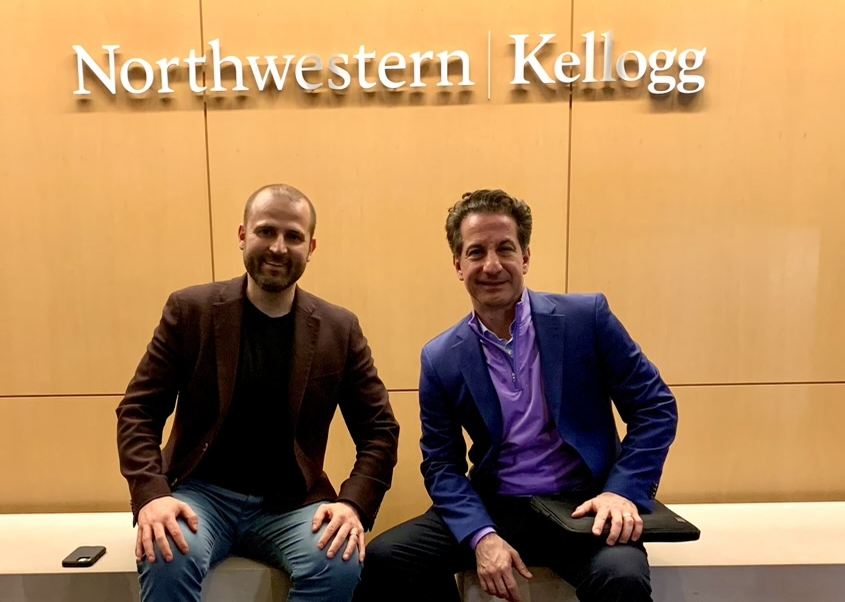
Volkan Emre, at left, and Kostas Poulakidas are 2023 graduates of Kellogg School of Management’s Executive MBA program. Together they founded the Entrepreneur <> Investor Initiative which aims to connect student entrepreneurs and investors. Courtesy photo
Kostas Poulakidas is a project finance attorney and partner at Taft Stettinius & Hollister. After dipping his toe into real estate investing seven years ago, he became more interested in investing in operating companies or startups in early funding rounds.
Volkan Emre is an EVP of operations and CFO at Tayse, a fast-growing home decor company that acquired his AI startup in 2015, back before AI was sexy. He’d like to get back into entrepreneurship.
What could happen if you got these two guys in a room?
The possibilities abound, but one outcome we know for sure: After being assigned the same Executive MBA study group at Kellogg School of Management, the pair formed a student-led initiative that connects entrepreneurs and investors.
TWO SIDES TO THE SAME COIN
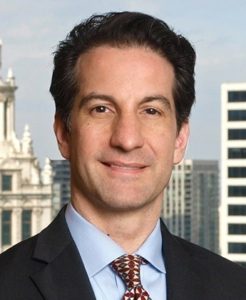
Kostas Poulakidas
When Poulakidas, EMBA ‘23, arrived at Kellogg in 2021, he formed a small group of like-minded students who wanted to learn all they could about investing in companies and startups while taking advantage of Kellogg’s vast resources and network. They got together over lunch or coffee and shared their knowledge.
Emre, EMBA ‘23, was working with a similar group of budding entrepreneurs. The two got to talking, casually at first and then with more intention.
“Investor and entrepreneur are just different sides of the same coin,” Poulakidas tells Poets&Quants. “We thought, we should put everyone in the same room and just see what happens.”
ENTREPRENEUR <> INVESTOR INITIATIVE
They began an informal group called the Kellogg EMBA Entrepreneur <> Investor Initiative in December 2021. It is loosely organized around four building blocks.
First, immersive workshops during each class weekend. EMBA entrepreneurs talk about their venture ideas while investors share their investing interests and portfolios. Just four people showed up to their first meeting. By the end of the cohort’s term, 50 to 65 students were regularly attending.
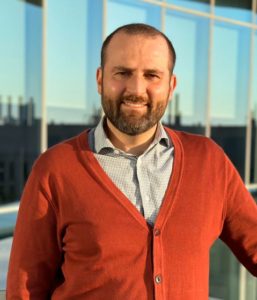
Volkan Emre
Second, speaking events for accomplished entrepreneurs and investors to share insights and lessons learned.
Third, as interest grew, Emre and Poulakidas held campus-specific pitch sessions across Kellogg’s EMBA cohorts. This led to a unified pitch session during Kellogg’s Global Network Week, a required immersion every August where EMBA students from Kellogg programs around the world convene in Evanston. The initiative hosted five different pitch sessions in five Global Network Weeks in 2022. The last attracted more than 300 people.
“We saw that as an opportunity to allow international team members to pitch their ideas to a global audience. And it was honestly the most important validation point for us,” says Emre, a 2023 Best & Brightest EMBA. “It was the biggest jump from a smaller cohort-centric or campus-centric event to a global one. It was a big validation point for us, but also for the Kellogg administration to see the value of the interaction.”
Finally, the pair launched the LEHI Pitch Competition. The acronym stands for “Low Ego, High Impact,” a Kellogg credo for shaping strong leaders.
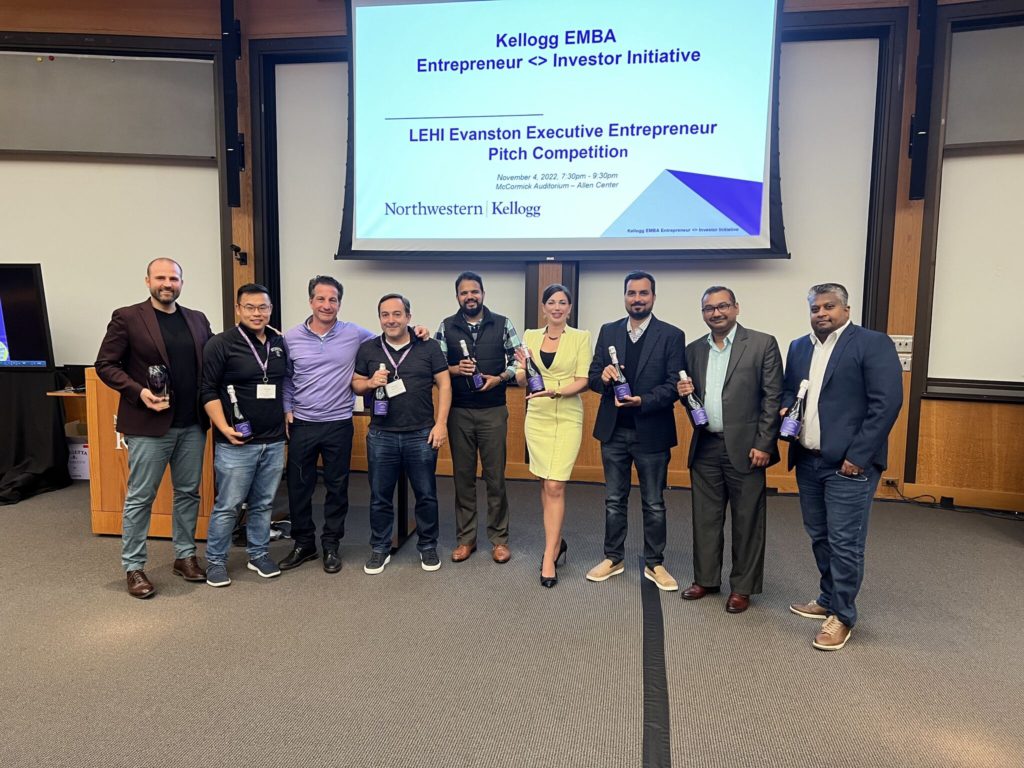
Winners of the November 2022 LEHI Evanston Pitch Competition. Courtesy photo
‘LOW EGO, HIGH IMPACT’
LEHI is a little different from other pitch competitions. It invites entrepreneurs and investors from the Kellogg community to participate online. Instead of official judges of Kellogg professors or seasoned VCs, it asks the audience to vote on their favorite ventures. It doesn’t pick a first-, second- or third-place winner, but three or four top presentations.
And, viewers pledge monetary support in real time to be split among the top three winners of the day. The money awards are small, but that isn’t the point. The point is to come, showcase your idea, and get immediate feedback and encouragement.
“It became very, very interactive. The audience was asking questions and going back and forth. Volkan and I stepped aside and became more akin to timekeepers,” Poulakidas says of the first competition. “We had people who contributed $5, we had people who contributed $500.”
Poulakidas and Emre organized two LEHI competitions during their time at Kellogg, one in November 2022 and the other in May 2023. Curious, Poulakidas asked some of his classmates who had donated to the ventures why they’d laid down their money. They told him they just wanted the founder to succeed, whether or not they make a return. They believed in their classmate, saw their passion, and hoped the encouragement would push them forward.
A PSYCHEDELICS STARTUP ATTRACTS ATTENTION
Julie Marie Ellis, EMBA ‘23, heard about the Entrepreneur <> Investor Initiative via word of mouth. The attorney and consultant was actively working on her own venture, a psychedelic therapies and care model called Thrive Entheogen.
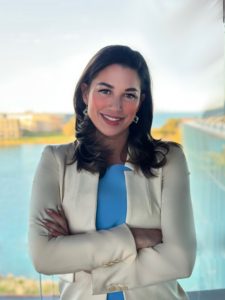
Julie Marie Ellis, EMBA ‘23
Over the last five years, the FDA has awarded breakthrough Therapy Designation to multiple psychedelic therapies. Some are used to treat some of the most prevalent and debilitating mental illnesses like PTSD and depression, but few people are aware of the fact, says Ellis, recipient of Kellogg’s Drake Scholarship awarded to women pursuing careers with impact.
“The standard bearers for the psychedelic movement have been predominantly athletes and veterans – meaning they are almost exclusively men – which distorts our view of the issue. For PTSD, 67% of the segment are women and women are 7 times more likely to identify gender-based-violence as the precipitating trauma. The statistics are similar for depression,” she says.
“With numbers like these, we can’t ignore the female quotient in both education and the care model – and that’s where my venture is focused.”
At the urging of her classmates, Ellis presented her pitch at the November 2022 LEHI competition. She was one of three audience-selected winners, taking home about $3,000 for her venture, no strings attached. That’s not enough to either make or break a start-up, but that’s not what the competition aims to do.
“The real power is knowing this was crowd-funded by a group of professionals, the majority of whom I’d never met, who believed in the vision, the value proposition, and me as a founder. That feedback is priceless,” Ellis says.
“So much of early-stage funding is based on trust and shared connection. Considering the share of female co-founded VC funding is 16% and female-only funding is 2%, there’s some kind of disconnect happening. In contrast, LEHI’s female participation in the winner’s pool was 33%. This is a testament to Volkan’s and Kostas’ focus on inclusivity.”
She continues: “For me, LEHI has opened many doors. I am excited about this model both for Kellogg and the entrepreneurial community more broadly.”
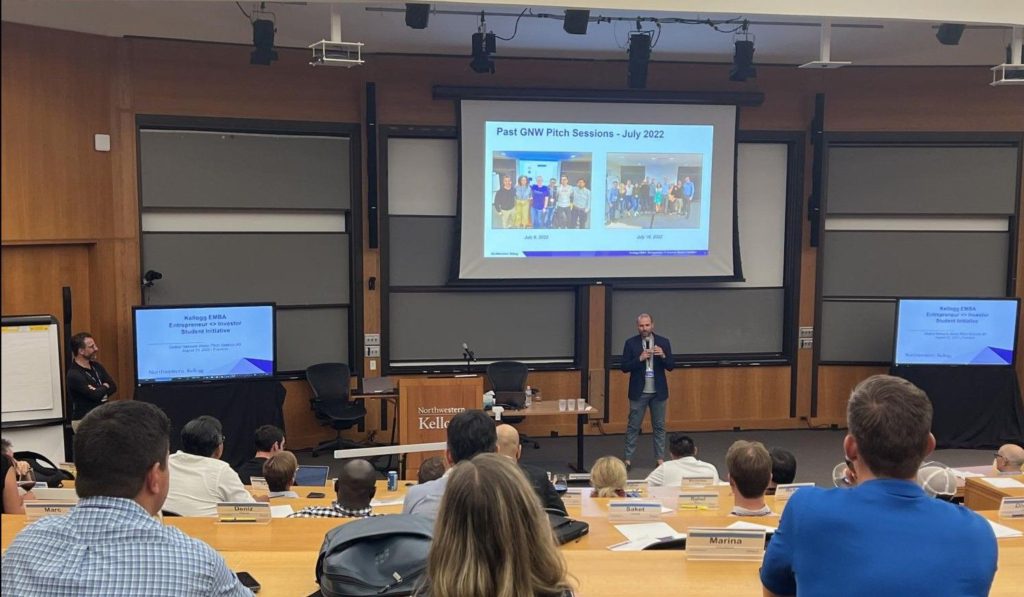
An August 2022 pitch session during Kellogg’s Global Network Week.
WHAT COMES NEXT
For Emre and Poulakidas, the most rewarding outcome of their initiative was the connections made between entrepreneurs and investors.
“We saw people pitching their ventures, ventures becoming real, and other Kellogg team members joining their boards,” Emre says. “The biggest reward through the whole process is getting feedback from people in the cohort who are C-level executives at Fortune 500 companies, or who are partner-level strategy consultants at McKinsey, BCG, and Bain. Getting their feedback is the most important reward for Kellogg entrepreneurs.”
Both Emre and Poulakidas graduated from the Kellogg EMBA program in June. They passed the initiatives framework to existing students, and it will be up to them to keep the initiative going. Both were invited to give opening remarks at the new cohort’s first pitch session.
The next step, perhaps, is building the bridges between Kellogg alumni and active students to make the same kind of venture-investor connections.
So what about these two founders, the investor and entrepreneur? What did they get out of their grassroots initiative started through casual conversations after finding themselves in the same study group?
Emre was inspired to start a new side venture, also in AI, bringing back some ideas that he’d set aside as a busy executive. He’s using the hours he previously devoted to his Kellogg EMBA to build it.
Poulakidas was invited to the board of a classmate’s venture and he personally invested in two others.
“One of my goals in coming to Kellogg was to learn more about business operations and how to be a smarter investor and a better strategic partner. I never thought it would have materialized the way it did,” he says. “It far surpassed my expectations. I don’t feel like I’m an investor, I feel like I’m supporting my friends.”
DON’T MISS: KELLOGG ABROAD: HOW MBAS LEARN REAL-WORLD IMPACT THROUGH TRAVEL and WHAT’S NEW IN KELLOGG’S ‘FOUNDER FOCUSED’ ENTREPRENEURSHIP PROGRAM





Questions about this article? Email us or leave a comment below.